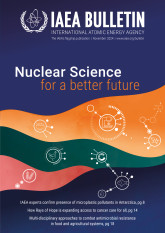
If you would like to learn more about the IAEA’s work, sign up for our weekly updates containing our most important news, multimedia and more.
Nuclear Science, Technology and Applications and the Technical Cooperation Programme
Kwaku Afriyie

Kwaku Afriyie is the Minister for Environment, Science, Technology and Innovation of Ghana and the co-chair of IAEA’s 2024 Ministerial Conference on Nuclear Science, Technology and Applications and the Technical Cooperation Programme.
Nuclear science and technology have significantly impacted various aspects of human life, ranging from healthcare advancements to industrial processes. Global platforms such as the IAEA Ministerial Conference on Nuclear Science, Technology and Applications and the Technical Cooperation Programme unite experts, policymakers and stakeholders to discuss progress in these fields and shape global nuclear policies, safety standards, and the socioeconomic benefits of nuclear technology.
One major area of growth in nuclear science over the past decade is nuclear medicine, in particular in diagnostic imaging and cancer treatment. Radiation technologies are also increasingly applied in food irradiation and sterilization, and various industrial processes. The construction of new reactors, in particular in Asia, reflects a resurgence in nuclear energy, with advancements in research reactors further emphasizing its importance. Innovations such as small modular reactors and advanced pressurized water reactors are notable for their potential non-power applications, including water desalination and medical radioisotope production.
The renewed interest in nuclear energy arises from the need for clean, cost-effective and reliable energy sources to combat climate change. Safety concerns, high costs and waste management challenges — especially after accidents like those at Three Mile Island (1979), Chornobyl (1986) and Fukushima (2011) — have been mitigated through technological advancements, improved safety protocols and a shift in public perception. As a result, nuclear technology is increasingly seen as a solution to global energy challenges and a key contributor to the United Nations’ Sustainable Development Goals (SDGs), in particular in health, food security and environmental sustainability.
In developing regions like Africa, nuclear science is playing a transformative role, with the IAEA providing technical cooperation to build local capacity. In Ghana, nuclear techniques including food irradiation and mutation breeding are applied in agriculture to develop disease resistant crops like cassava, a staple, thus improving food security and managing post-harvest losses. The Food and Agriculture Organization of the United Nations estimates that one third of global food production is lost to pests and spoilage, exacerbating hunger for over 700 million people. Technologies such as food irradiation, which extends the shelf life of food and reduces foodborne illnesses, and the sterile insect technique, which manages pests such as tsetse flies, fruit flies and mosquitoes, are instrumental in addressing these challenges, in alignment with the IAEA’s Atoms4Food initiative.
Nuclear science is also having a substantial impact on cancer treatment. According to the World Health Organization, over 70 per cent of cancer deaths occur in developing countries, primarily due to limited access to treatment equipment and services. Expanding access to radiotherapy is essential in addressing this public health crisis. The IAEA’s Rays of Hope initiative aims to provide radiotherapy equipment and training in regions where cancer treatment is limited, in particular in Africa.
Beyond healthcare and agriculture, nuclear technologies are used in water resource management and geological resource exploration. In Ghana, isotope hydrology is used to trace underground water movements for better water management. Ghanaian scientists are participating in global efforts to combat plastic pollution through nuclear-based initiatives under the IAEA’s Nuclear Technology for Controlling Plastic Pollution (NUTEC Plastics) initiative. The country is working with the IAEA Milestones Approach to guide its phased process of implementing nuclear power as part of its energy transition programme.
“ "In developing regions like Africa, nuclear science is playing a transformative role, with the IAEA providing technical cooperation to build local capacity.”
Human resource development has been crucial to the growth of nuclear science in Ghana and across Africa. The IAEA’s technical cooperation (TC) programme has trained over 730 graduates in nuclear science through the School of Nuclear and Allied Sciences at the University of Ghana, which serves as a regional designated centre (RDC). Efforts to increase women’s participation in science, technology, engineering and mathematics (STEM) disciplines, through initiatives like the IAEA’s Marie Skłodowska-Curie Fellowship Programme, are essential, in particular in the Global South where gender disparity remains high.
Ghana’s progress in nuclear science has positioned it as a leader and role model in Africa capable of contributing to knowledge sharing efforts. With IAEA support, the country has received accreditation to host RDCs for education and training in nuclear sciences, medical physics, radiation protection, and safety. Its Biotechnology and Nuclear Agriculture Research Institute has become Africa’s first IAEA Collaborating Centre in the field of plant breeding and genetics. This progress highlights the importance of international cooperation in advancing nuclear science for development.
Looking ahead, the role of nuclear science in achieving the SDGs by 2030 cannot be overstated. For sustained progress, international cooperation, stronger regulatory frameworks and investments in nuclear infrastructure — especially in radioactive waste management — are vital. Human resource development in the Global South must be scaled up to produce skilled workers capable of maintaining and advancing nuclear technologies. Public education on the benefits and risks of nuclear science is equally crucial to increase acceptance and ensure its safe, equitable and effective application worldwide.
The conference therefore offers a timely opportunity for stakeholders to explore these issues and plan for the future of nuclear science and technology. Through the IAEA’s TC programme and sustained international collaboration, nuclear science can continue to address some of the world’s most pressing challenges.


